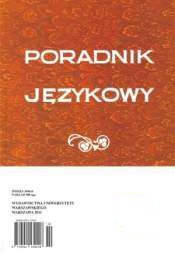WIEDZA I WSZECHWIEDZA. CZY CZŁOWIEK MOŻE MIEĆ WOLNĄ WOLĘ, JEŚLI BÓG WIE WSZYSTKO?
Knowledge and God’s foreknowledge. Does man have free will if God knows everything?
Author(s): Piotr SobotkaSubject(s): Language and Literature Studies
Published by: Dom Wydawniczy ELIPSA
Keywords: wszechwiedza; predykat wie; że
Summary/Abstract: Taking the logical-linguistic point of view, the author considers the question of the relationship between God’s foreknowledge and the possibility of free decision-making by a human being. Different solutions of the problem being discussed (whether men are determined in their actions by the foreknowledge of God) were offered by philosophers of the Middle Ages (including Boethius, Peter Abelard, Thomas Aquinas) but also by contemporary ones (Søren Kierkegaard, Arthur Schopenhauer, Alvin Plantinga) as well as logicians (e.g. A.N. Prior). The author makes a critical overview of these solutions and suggests his own approach to the problem in question, rooted in the scholastic philosophy. God, as an Omniscient Being, is – as Boethius said – a Timeless Being, so His act of knowing is well beyond the time. God’s foreknowledge does not affect our actions, because they (understood as the objects of His knowledge) are first in ‛ontological’ order. The truth conditions of a sentence The Socrates’ father, Sophroniscos, was born in the first half of the 5th century BC are associated with two events that took place at different points of time. This does not mean that the phrase came to be true only after Sophroniscos had beget Socrates, nor Sophroniscos – due to one of the truth conditions of the sentence in question – was forced to beget Socrates in the second half of the 5th century BC. This view also forms the foreknowledge of God: for Him both the birth of Sophroniscos and the birth of Socrates are simultaneous.
Journal: Poradnik Językowy
- Issue Year: 2011
- Issue No: 01
- Page Range: 72-83
- Page Count: 12
- Language: Polish
- Content File-PDF

